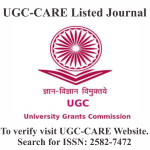EXPLORING THE DIVIDE: MODERNITY AND PRIMITIVISM IN ARUN JOSHI’S ‘THE STRANGE CASE OF BILLY BISWAS’
DOI:
https://doi.org/10.29121/shodhkosh.v5.i1.2024.3787Keywords:
Modernity, Primitivism, Identity, Arun Joshi, The Strange Case of Billy Biswas, Alienation, Tribal Values, Spiritual Regeneration, Urban Materialism, Existential CrisisAbstract [English]
This research paper examines the thematic tension between modernity and primitivism in Arun Joshi's The Strange Case of Billy Biswas, focusing on the protagonist's quest for self-discovery and spiritual regeneration. The novel criticizes post-independence Indian society's moral and cultural decay, juxtaposing the superficial materialism of urban elites with the spiritual authenticity of tribal life. Billy Biswas, disillusioned with modern civilization, abandons its artificiality in favor of a primitive existence that restores his sense of purpose and connection with nature. The story vividly depicts his transformation, revealing both the hollowness of modernity and the redemptive power of primal values. Joshi's juxtaposition of the civilized world with tribal innocence serves as a profound meditation on identity, existential alienation, and the search for authenticity in a mechanized world.
References
Ghosh, Tapan Kumar. Arun Joshi’s Fiction: The Labyrinth of Life. Prestige Books, New Delhi, 1996.
Joshi, Arun. The Strange Case of Billy Biswas. Orient Paperbacks, New Delhi, 1986.
Sharma, Siddarth. Arun Joshi’s Novels: A Critical Study. Atlantic Publishers, New Delhi, 2004.
Bhatnagar, M. K. The Novels of Arun Joshi: A Critical Study. Atlantic Publishers, New Delhi, 2001.
Bhatnagar, O.P. “The Art and Vision of Arun Joshi in Dhawan.” 1986.
Dhawan, R.K. The Novels of Arun Joshi. Prestige Books, New Delhi, 1992.
Downloads
Published
How to Cite
Issue
Section
License
Copyright (c) 2024 Dr. Indu Tyagi

This work is licensed under a Creative Commons Attribution 4.0 International License.
With the licence CC-BY, authors retain the copyright, allowing anyone to download, reuse, re-print, modify, distribute, and/or copy their contribution. The work must be properly attributed to its author.
It is not necessary to ask for further permission from the author or journal board.
This journal provides immediate open access to its content on the principle that making research freely available to the public supports a greater global exchange of knowledge.




















